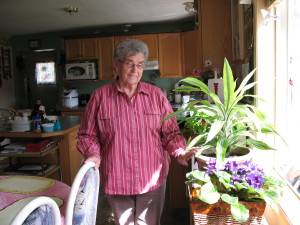Although as a child Carrie Allison completed only the fourth  grade, I came away from a two hour visit with her feeling I’d been educated in history and wisdom. She was sent from her home in the Merritt area where she was born, to a residential school in Kamloops at age 8 and was educated there until age 12.
grade, I came away from a two hour visit with her feeling I’d been educated in history and wisdom. She was sent from her home in the Merritt area where she was born, to a residential school in Kamloops at age 8 and was educated there until age 12.
Carrie is now 83 and even though her experience in the residential school wasn’t as horrific as what we often hear about in the media, the memories still haunt her. A note of sadness creeps into her voice when she says, “my dreams about it are always bad. In one dream I hearing a baby crying at night, but it is dark and I can’t find it.”
She pauses a moment to reflect, then continues. “I was away from home 10 months at a time. There wasn’t enough to eat and I was always hungry. We ate in the same room as the staff, and we could see they had meat on their plates. We were given only vegetable soup and one slice of bread. At Easter they gave us one egg with our meal. I knew mostly the language of my people, but I was punished if I spoke it. In winter they made us walk to town. My hands and feet got really cold. We weren’t allowed to talk to the boys or even look at them. We were in the classroom half a day, the rest of the day we had to work. The girls cleaned up the dormitories, the priest’s room, the hallways, play room and dining hall.”
Knowing she looks after the diminutive white chapel situated on a bluff overlooking the Similkameen Valley, not far from Hedley going toward Keremeos, I ask why she is still involved with the Catholic faith. Many would have turned their backs on the faith because of the pain caused by the school experiences.
“People sometimes ask me that,” she answers. “I tell them God didn’t do that to me. It was people. I never look back. I tell the kids to always look ahead and try to make something of themselves.”
Carrie never knew her father. Fortunately her mother was deeply committed to her family and Carrie speaks of her as a wonderful role model. “She was very small,” she says. “She tanned hides and traded them in town. She also made gloves and moccasins.”
Carrie recalls clearly the injunction of her mother to “take care of yourself. No drinking. Before you go away, do the dishes and clean the house.”
Now a mother and grandmother herself, she does all she can to pass on the values of the older generation. “Young kids don’t know what we went through,” she says with a perceptible hint of disappointment. “Sometimes I think we should take them back to our time. No electricity, no indoor bathroom. We had to pack water from the river. Mom didn’t have a washing machine so she carried her laundry to the river. She heated water in a tub there and after she washed the clothes, she hung them on branches.”
I sense now that in her mind she is reliving those times. “Sometimes we bathed in the river. In winter we heated water in the tub and bathed there. Those were happy days. I was with my family.”
